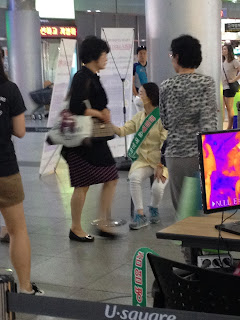Middle
East
Respiratory
Syndrome
Much like saying the word bomb in an airport, you need to be
careful when uttering the name MERS in Korea.
 |
Being a fairly small country with a large population, the
spread of disease is a real concern. The media however plays an important role
to informing people about how to respond to any new threat. Since, I don’t
understand Korean, I’m not sure what people are being told through Korean news,
but it is clear that everyone is very concerned and afraid of this virus.
In some ways, it has helped reinforce important things like
washing your hands with soap and water. I can’t count how many times I’ve used
a public bathroom or even the bathrooms at school to find that there is no soap
to wash my hands with. Once the MERS outbreak made headlines in Korea, there
have been soap dispensers placed near every sink in my school. When visiting
the large movie theater at the Gwangju bus terminal, I saw signs in Korean
posted next to the soap dispensers that I’ve never seen before. I think we can
assume it has something to do with the MERS virus.
 |
| A MERS Public health poster at Neungju Elementary |
In other ways, the fear of MERS has become a little
ridiculous. Although not much is known about MERS since it’s debut in 2012 in
Saudi Arabia, it has been found to be transmitted though close personal
contact. Here’s what the World Health Organization has to say about
transmission among humans.
“The virus does not appear
to pass easily from person to person unless there is close contact such as
providing clinical care to an infected patient while not applying strict
hygiene measures. This has been seen among family members, patients, and
health‐care workers. The majority of cases have resulted from human-to-human
transmission in health care settings.”
So far all the confirmed cases (126) in Korea have been
linked spread within hospitals. Sadly, the majority of deaths from the virus
(24 as of June, 19th) have been elderly people who were being
treated at the hospital for other serious conditions. Val and I visited our
hospital in Hwasun last week to get a vaccination for our upcoming trip to
Thailand. Being my second trip to a hospital since our original visit during
orientation, I noticed many different things from my limited time in American
hospitals. In Korea, people go to the hospital for almost everything that we’d
normally see our regular doctor for. When going to the doctor in America, I’m
used to arriving 10 minutes early to my appointment, and then waiting about 20
minutes before going to the second waiting room where the doctor and nurses
will come visit you. At this hospital, there are different areas for different
things, so to get our Hepatitis A vaccination; we had to travel to 4 different
places around the hospital. The idea of having potentially sick people run
around a hospital doesn’t seem like the best way to prevent a virus that lives
within hospitals. Oh yeah, and Val’s school insisted that we take a pair of
face masks to wear at the hospital, which did not have any MERS patients
at the time (and still doesn’t). Korea does have smaller private clinics
that may be different, but thankfully,
we have yet to visit one
 |
| Hospital Face Mask Selfie! |
Since MERS is not a very contagious virus and not usually
seen in younger people, there have been no travel restrictions advised by the
CDC. Despite what the CDC says, many schools in Seoul decided to temporarily
close. Schools in Hwasun County, where we live, are not planning to close, but
many school field trips were postponed until further notice. Every couple days,
some teachers ask me how my condition is, just to make sure I don’t have MERS. We
have witnessed thermal screening for bus arrivals at the Gwangju Bus Terminal,
and we’ve heard from other native English teachers that some schools are taking
everyone’s temperature once to twice a day.
 |
| Thermal screening at the bus terminal |
The one thing that blows my mind is that even with some of
these somewhat extreme precautionary measures, we really need to teach people
to cover their cough and/or sneeze. When riding the bus, which is a very
popular mode of transportation for the elderly (the main group at risk), I
cringe when I see people coughing and sneezing with no attempt to cover up. Who
knows what disease could be lurking in those spray particles.
 |
| Korean media about MERS. |
Are
WE worried about MERS?
In short, not really. Each night we pray for the people that have been affected by this
outbreak, but we realize the risk to healthy younger people like ourselves (who
do not frequent hospitals) the risk
is very low. We’ve both been asked a few
times at random by various staff members “Aren’t you afraid of MERS?!” and each
time we respond with a simple “No.” My co-teachers do not understand why
I am not afraid, I hope this virus
will be contained soon and they will not have to fear it either. Thankfully, we’re already starting to see a decrease in the
fear of MERS, we’re getting less emails from the US Embassy explaining the situation,
so that’s always a good sign! :)
Anyways, we wanted to write this post mostly to keep as a
memory for us and of course, to inform! :)
On a side note, we just realize that as of June 20th, we have
exactly 8 weeks left in our contracts, which means in 8 weeks we will be
completely moved out of our apartment and on to our next adventure! We can’t
believe it! Prayers for this upcoming transition would be so appreciated!

No comments:
Post a Comment